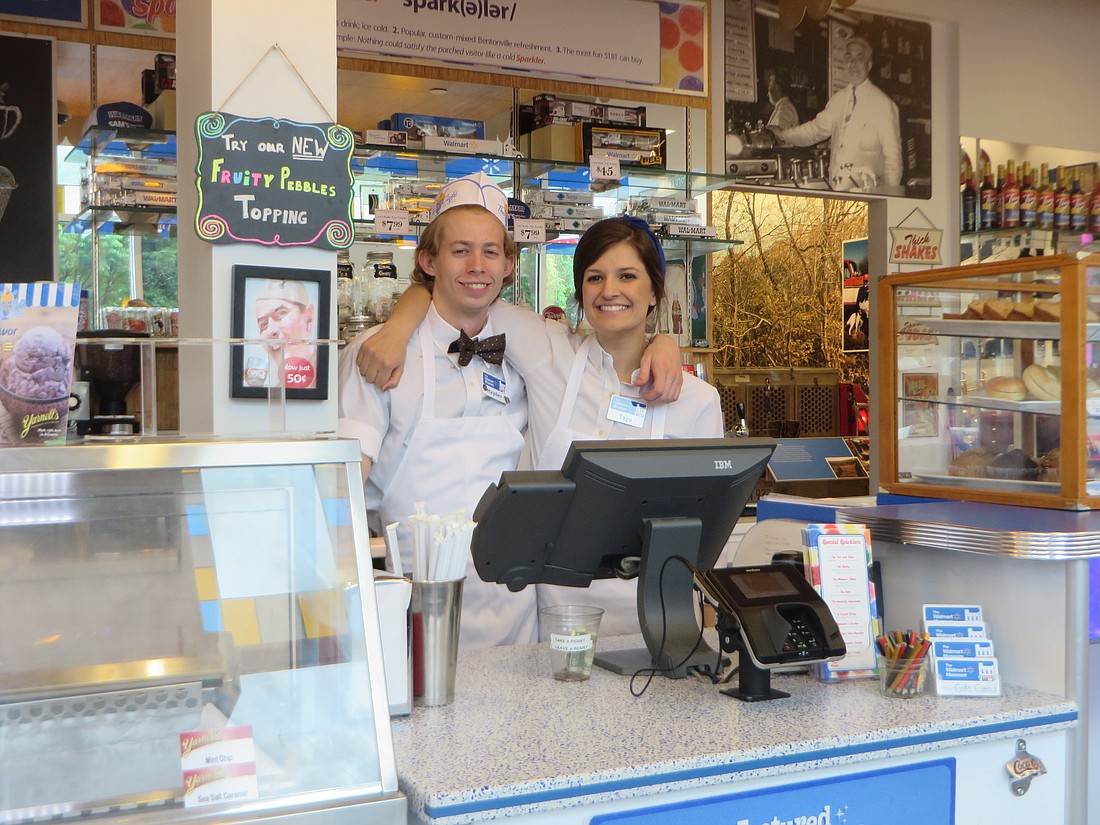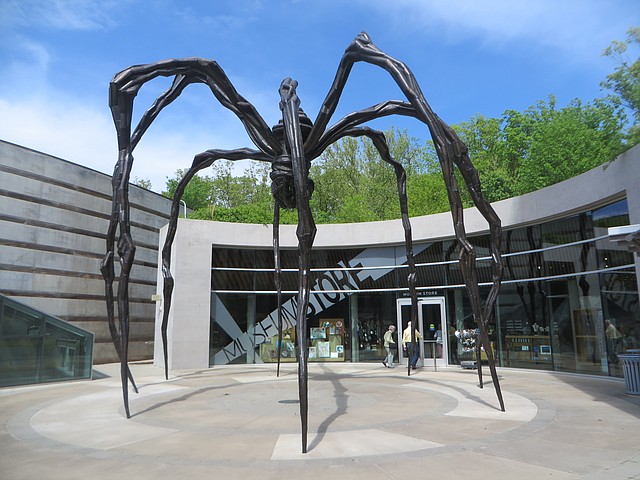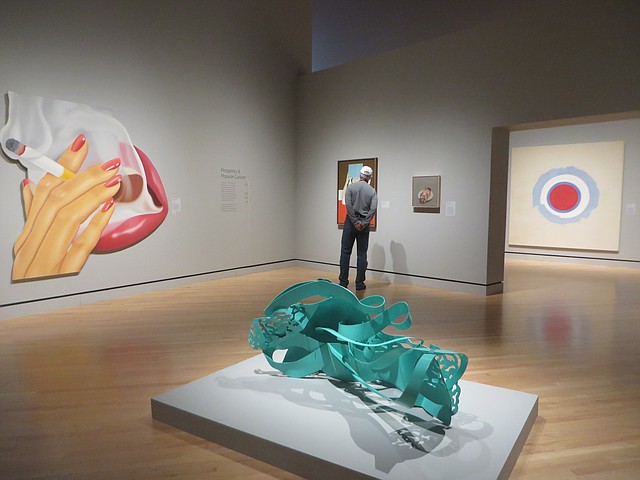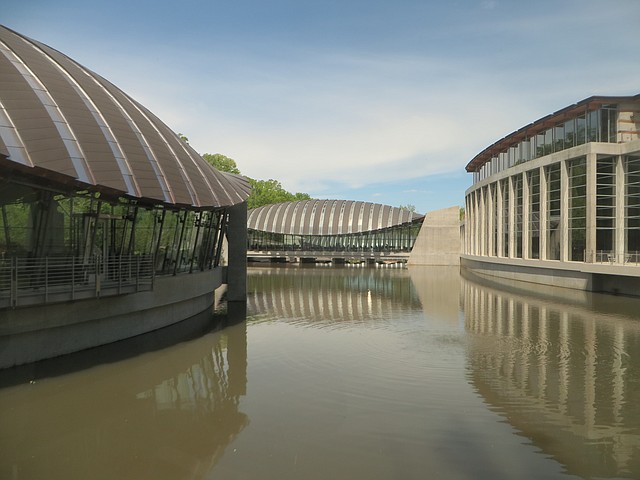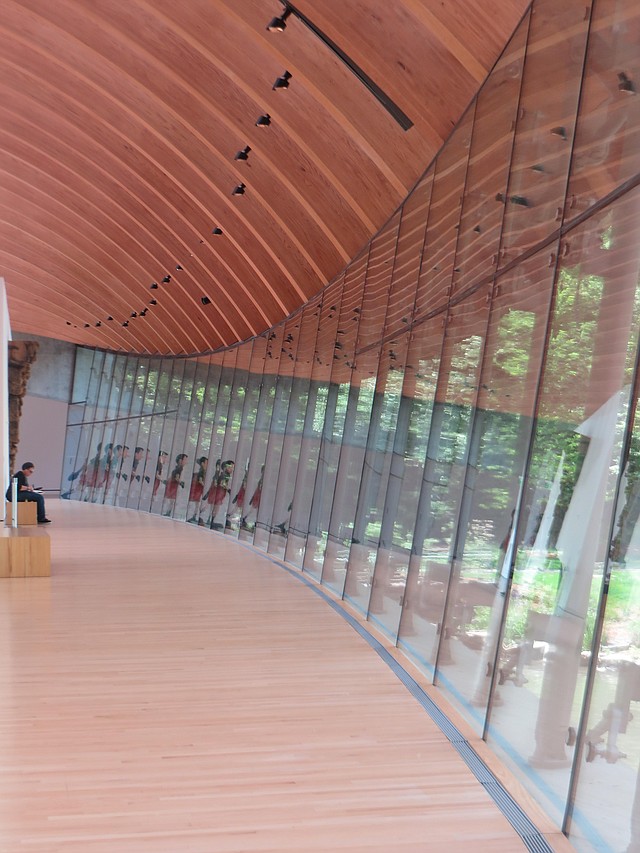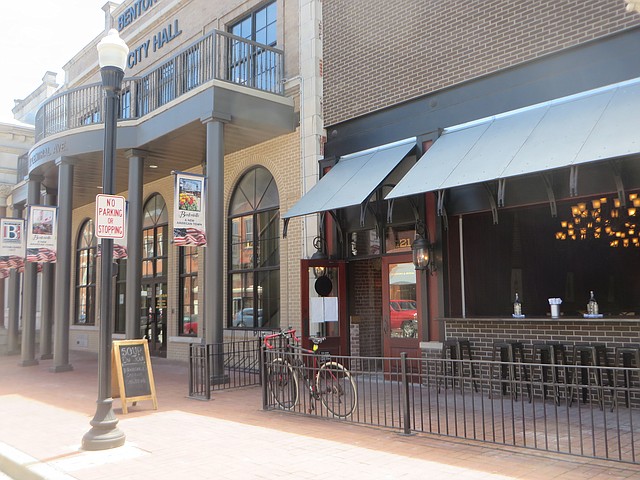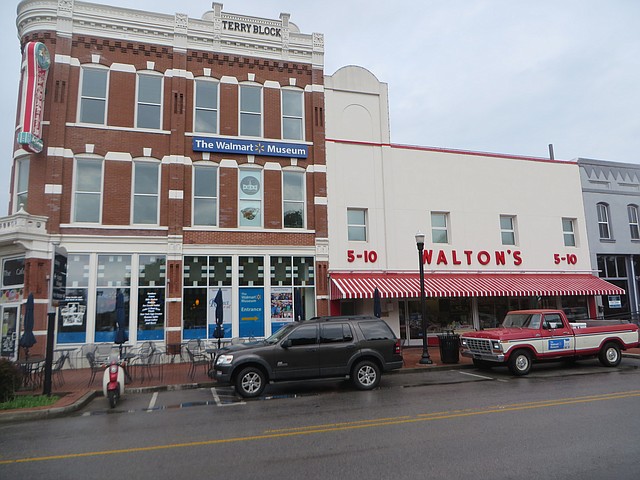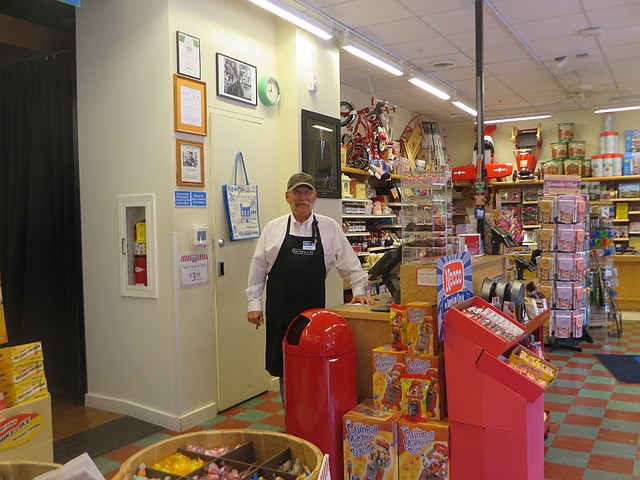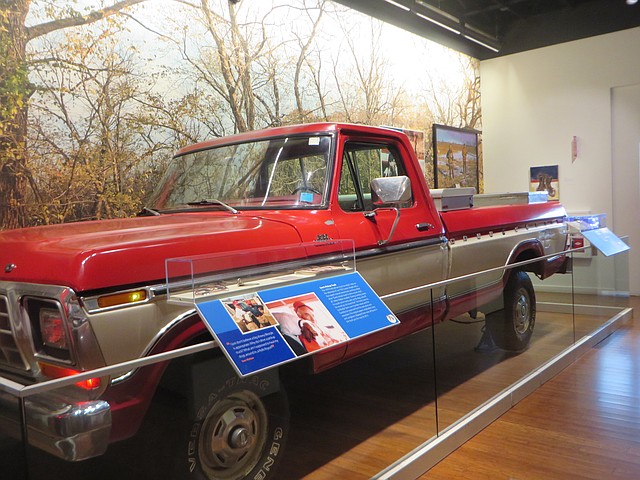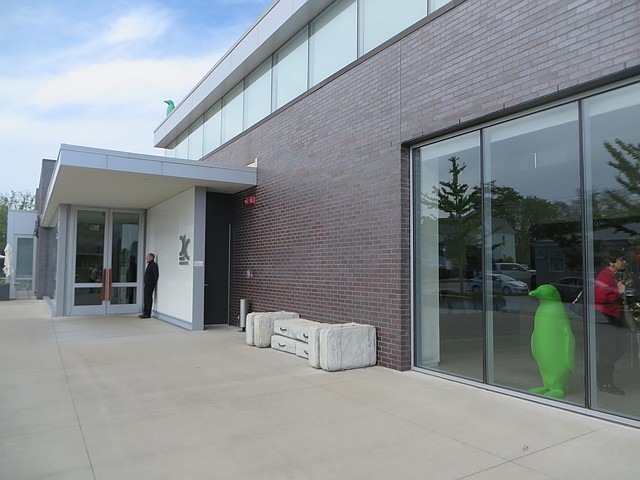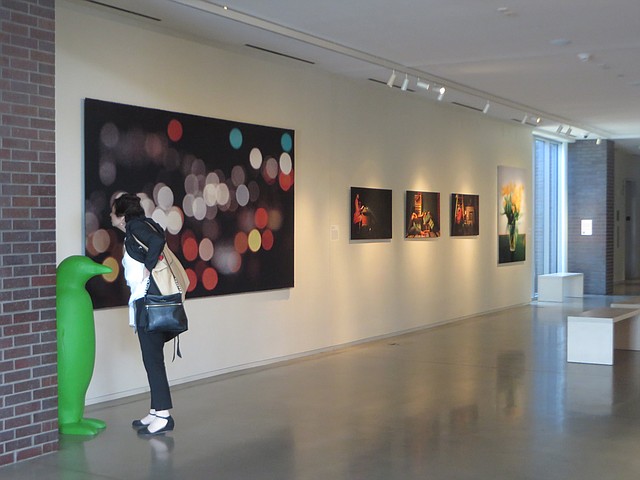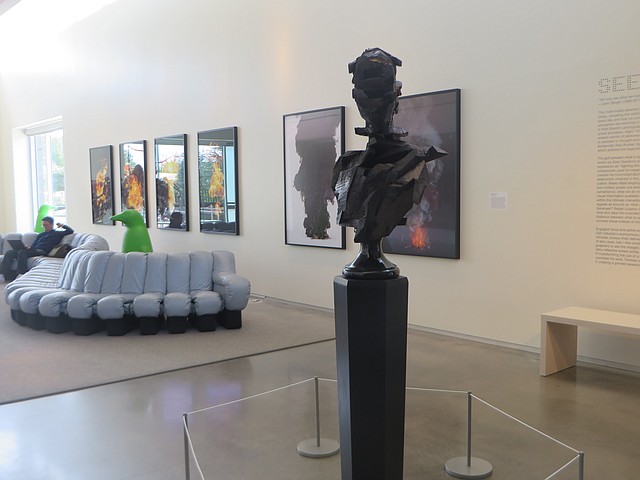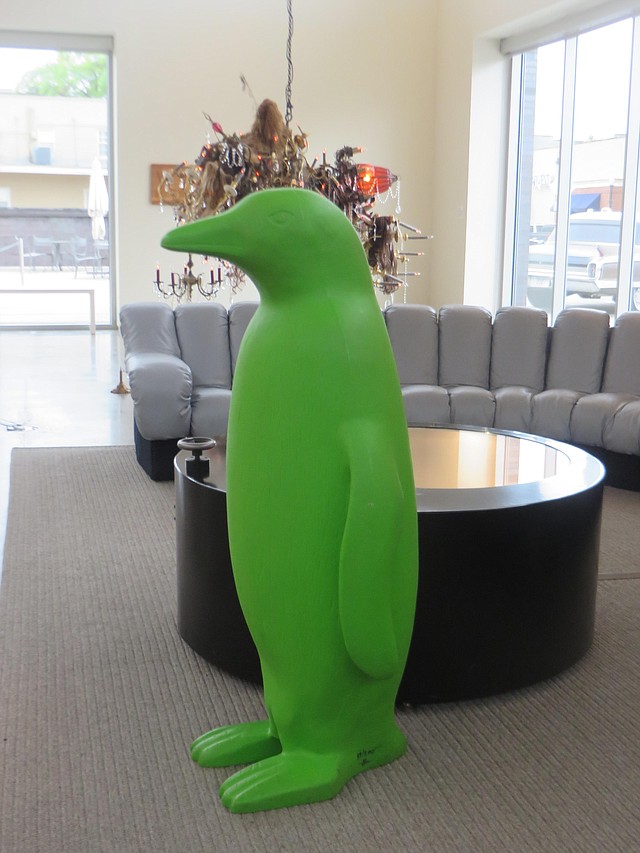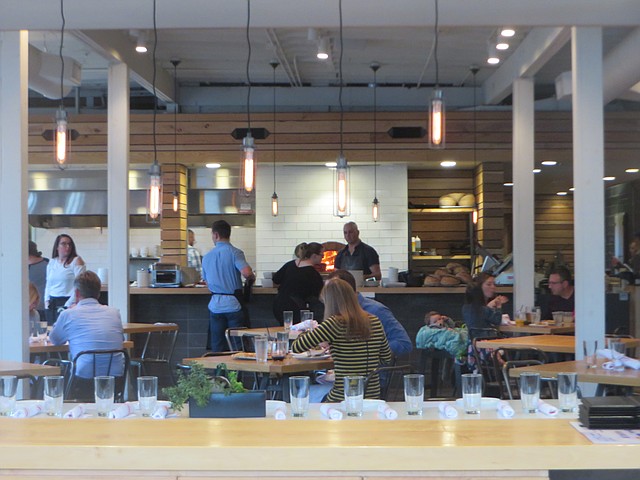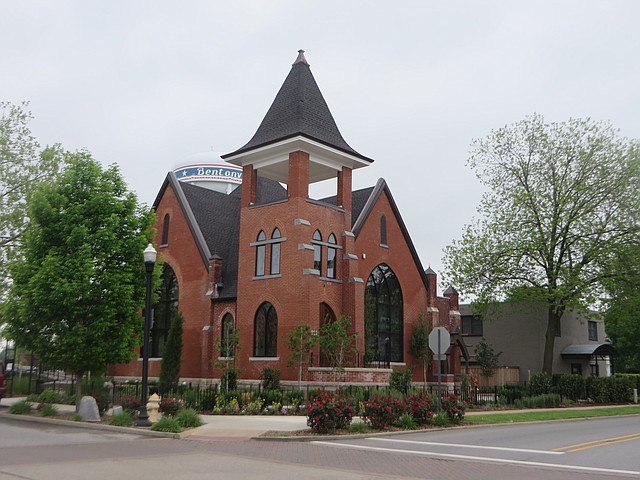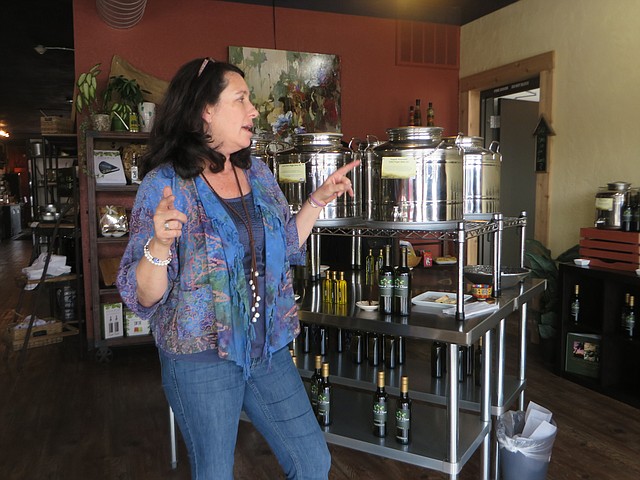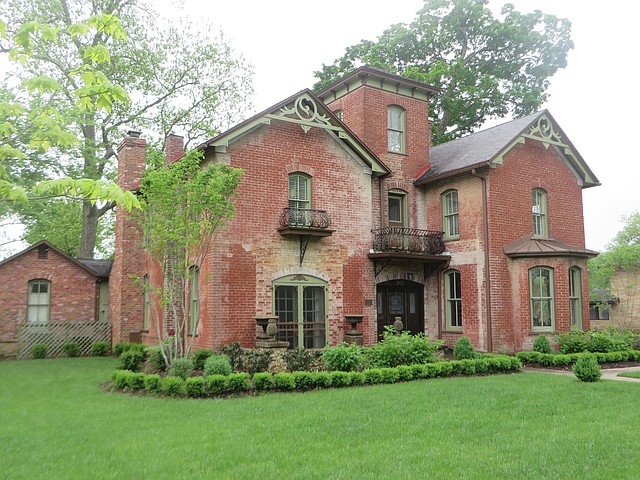Mayberry meets Manhattan in Bentonville, Arkansas
June 26, 2017 at 6:00 a.m.
Telling friends and family I was going to Bentonville, Arkansas was akin to informing them I was going to Siberia based upon their reactions. I received baffled looks, followed by questions like, “Why?” “Whatever for?” and my favorite, “You’re doing this on purpose?” I tried explaining the reasons for my trip; the primary one being to visit the renowned Crystal Bridges Museum, but still the confusion and puzzlement persisted. I admit Arkansas had never been one of those must-go-to destinations for me, most likely due to not knowing much of anything about our country’s 25th state. I envisioned the place to be mostly rural and lacking in sophistication and culture. But, when I began hearing murmurs of this acclaimed art museum (in Arkansas of all places!), my curiosity was piqued.
Crystal Bridges Museum of American Art is the brainchild of Walmart heiress, philanthropist and arts patron, Alice Walton. Since its opening in 2011, the institution, which is free to the public, has welcomed more than three million visitors. With more than 50,000 square feet of gallery space and a collection worth hundreds of millions of dollars, the museum has fast become a place of pilgrimage for art lovers from around the globe. It boasts a permanent collection spanning five centuries of American masterworks ranging from the Colonial era to the current day. The art tells the unfolding story of our country’s history with such iconic images as Asher B. Durand’s “Kindred Spirits,” Gilbert Stuart’s “George Washington,” Norman Rockwell’s “Rosie the Riveter and Andy Warhol’s “Coca-Cola,” each reflecting a particular moment in American artistic evolution.
In the first two pavilions, which are dedicated to late 19th century art, stirring works by well-known artists as Winslow Homer, Thomas Moran, Mary Cassatt and John Singer Sargent are represented. The ensuing 20th century galleries feature works in the Ash Can School, American Scene painting and abstract and representational Modernism styles by such familiar names as Georgia O’Keeffe, Alexander Caulder, Jacob Lawrence, Edward Hopper, Marsden Hartley and Claes Oldenburg. Postwar American art has its own place. Major heavyweights like Jasper Johns, Roy Lichtenstein, Andy Warhol, Jackson Pollock and Robert Rauschenberg take center stage, along with lesser known names such as Gene Dais, Will Barnet, Janet Sobel and Wayne Thiebaud.
The museum’s architecture is equally impressive. Famed architect Moshe Safdie designed the place with the goal of creating a dynamic environment for visitors to explore the heritage of America through a melding of art and nature. The museum is set in a lovely ravine carved by the Crystal Spring (from whence comes the name) and has over three miles of multi-user trails. Visitors who opt to walk from town will enter via Compton Gardens on a picturesque art trail dotted with Pawpaw trees and other lush foliage, leading to Crystal Bridges. Prepared to be wowed as you approach the museum. From the outside, with its curved, copper roof, the building looks like a ginormous creature nestled in the woods. The structure’s dramatic and stunning design consists of eight linked pavilions that border or span two large pools, which are fed by the nearby spring. In this manner, you are never far from nature as you walk through the galleries and appreciate the marvelous art collection, as well as the remarkable setting.
In particular, you’ll note the architect’s use of Arkansas pine wood, which is employed to mimic the curvature of the state’s landscape, particularly the rolling shapes of the Ozark hills. These organic shapes give the illusion that the museum is part of the scenery. And the play of light helps to unite material and form, connecting internal and external realms in a perfect melding of art, architecture and the great outdoors.
Crystal Bridges is also the site of a Frank Lloyd Wright House, which you can tour on your own or with a guide. Known as the Bachman-Wilson House, the structure is one of Wright’s Usonian (the word “Usonian” was derived from an abbreviation of “United States of North America”) homes, which were simpler and lower-cost than his custom residences. Each one was designed to be within the reach of the average middle-class American family, and was developed during the Great Depression. Approximately sixty Usonian homes were constructed in all. This house was built in New Jersey and had two subsequent owners before being sold to the museum in 2013, after it was determined that repeated flooding was threatening its existence and relocation was the best option for its preservation. The entire structure was documented, taken apart and shipped to Crystal Bridges where it was carefully reconstructed brick by brick.
The museum exceeded my expectations on every level, but it was Bentonville that really took me by surprise. This small northwest Arkansas town is a true gem. Behind its Mayberry-like charm, is a vibrant and growing city with elements of sophistication that are typically found in larger urban meccas. The place has an international reach simply by being home to Walmart, the mega worldwide retailer, which attracts countless numbers of business travelers each year. Other neighboring corporations like J.B. Hunt and Tyson Foods, as well as the University of Arkansas, also contribute to elevating the region in different ways.
The center of Bentonville is its quaint downtown square, where locals and tourists alike gather for various events ranging from farmer’s markets and concerts to festivals and open air movies. The square is where you’ll find the original Walton’s 5 & 10 store, now the entrance to the Walmart Museum. This was Sam Walton’s second retail operation, but the first to bear the Walton name. A Ben Franklin five-and-dime franchise, it was right next door to a space occupied by a barber shop, which Sam subsequently acquired. This small store became the start of a retailing empire now spanning the globe.
Today, visitors to the Walmart Museum can see a storefront virtually identical to its appearance when Sam opened it in 1950. The original tin paneled ceiling and red and green tiles that Sam laid down are still in place. Look closely and you’ll note the reds and greens don’t all exactly match. Story has it that Sam had been offered a better price on the batch of tiles if he accepted them “as is.” He knew that his customers wouldn’t be looking at the floor as long as his prices were low and his shelves, well-stocked. Being a frugal man, Sam realized that saving money on expenses meant he could charge lower prices, which would save his customers money.
The 5& 10 store is a flash from the past for many visitors who grew up in the 50s. It offers all sorts of nostalgic toys, games and candies with a retro appeal. Those of the era will reminisce over Wax Lips, Pixy Stix and Clark bars, while they recall playing with Lincoln Logs and Mr. Potato Head, or pulling their Radio Flyer wagons down the street.
Once inside the museum, you’ll find galleries with exhibits dedicated to the ubiquitous company and its founder. The tour is self-guided and proceeds chronologically in telling the history of the making of Walmart from its humble beginnings to the present – a corporation that currently has over 11,500 stores in 28 countries and 2.3 million associates. Walton’s story is an illustration of the American dream and his accomplishments were rewarded with the Presidential Medal of Honor in 1992, three weeks before his death. The museum has preserved his office, exactly the way it was left when he died. Also on display is Sam’s famous red, 1979 Ford pickup truck and the barbershop chairs he and his brother Bud used to sit in when getting their haircuts. Nearby is a magazine cover photo of Walton in the chair with the caption, “A $5 trim for a $2.8 billion head.” Visitors exit the museum into the Spark Café, an old fashioned soda fountain with killer malts and homemade ice cream that’s a favorite spot for both visitors and locals.
Other museums of note in Bentonville include the Museum of Native American History, where you can “Walk Through America’s Past” and get insight into what life was like for America’s first inhabitants; the Peel Mansion Museum and Compton Gardens, an 1875 Italianate Villa style home containing authentic antiquities and artifacts of the era, along with an adjacent outdoor museum of heritage roses, perennials and native plants; and the Scott Family Amazeum. Kids will particularly enjoy the latter with its hands-on activities and interactive exhibits that engage visitors with the land, industries and people who helped build Arkansas culture and sustain it today.
If you didn’t get enough art at Crystal Bridges, make sure to check out the 21c Museum Hotel. It’s a 104-room boutique hotel with a restaurant, contemporary art museum and cultural civic center all in one. Located in downtown Bentonville, within walking distance of restaurants and Crystal Bridges, the property seamlessly weds chic design, culinary creativity and contemporary art by emerging and internationally acclaimed artists. The museum consists of more than 12,000 square feet of exhibition space that is seamlessly integrated into all areas of the building, providing opportunities to discover art in every nook and corner. Galleries, which are free to the public, are open daily and exhibitions rotate several times a year.
As you approach 21c, you’ll feel as if you’ve been suddenly transported to some exotic world. Outside the property is Monica Mahoney’s “Making Change,” a Fleetwood Cadillac limo covered with thousands of nickels, dimes and pennies. The vehicle was built in 1962, the same year the Walmart Company was founded in Bentonville. The dollar amount represented by the coins on the limo, a total of $952, is the amount Walmart saves every household annually. In the courtyard nearby is Alexandre Arrechea’s “Orange Tree,” a large-scale sculpture of a metal tree sprouting basketball hoops surrounded by basketballs. You’ll also be drawn to the concrete bench by the entrance that looks like stacked suitcases, but offers a surprisingly comfortable perch to people watch.
Once inside the museum, you’ll encounter a multi-media selection of works by over two dozen artists who delve into the nature of perception. This current exhibition, titled, “Seeing Now,” reveals that though we are often troubled by violence, tragedy and injustice, we are sadly accustomed to their regularity in our society and may be blind to their causes and costs. Some of the artists like Terence Hammonds and Nidaa Badwan use light to reveal injustices. Hammond’s “And this is where the beat comes in,” consists of an installation of small light boxes, each containing a porcelain relief image of looting during the 1977 blackout in New York. Badwan’s “100 Days of Solitude” uses only soft light from one window and a lone lightbulb to document the artist’s surroundings and daily activities while living in Gaza in near complete isolation from the world for over twenty months.
Hank Willis Thomas’s prints are particularly interesting as they come alive only through flash photography on a mobile device. When you look at them with the naked eye, they appear as white-washed scenes, but once you take a picture of them with your cell phone, they reveal vivid instances of racial and social injustice. The artist offers the viewer a choice: to confront history or avoid it altogether. Similarly, Steve Mumford’s “Empire” takes a disturbing image that has appeared frequently in the media this century – jumpsuit-clad prisoners being boarded onto a U.S. carrier. The prisoners in the painting are blindfolded, while the soldiers look away, neither at their captives, nor at the viewer. The painting points to the normality of such instances and the resulting numbness in our response.
One of the more unique works onsite is Serkan Ozkaya’s “A Sudden Gust of Wind, Bentonville.” This installation is comprised of 400 sheets of metal that appear as a scattered stack of papers, frozen in motion across the ceiling and walls and down to the floor. It is a striking piece that speaks to arrested movement, and it functions beautifully in the surrounding light-filled space.
While you’re at 21c, you’ll undoubtedly encounter a life size plastic green penguin or two, in the museum area, restaurant, hallway, elevator, or even in your room. One is permanently stationed on the rooftop, keeping watch on the property’s comings and goings. The penguin is the mascot of 21c Museum Hotel (each property has a different color penguin). Apparently, these creations started as an art exhibit, which guests took to rearranging throughout the hotel. Eventually, they became a permanent feature that people can play with, which can obviously result in some amusing situations!
I had the pleasure of staying at the hotel during my visit. Like others that bear its name, the property is modeled after the company’s award-winning flagship in Louisville. Guest rooms are spacious with high ceilings, large windows and a relaxing residential feel. Each room is outfitted with custom-designed furniture, comfy beds, plush robes and upscale bath products. Amenities include a fitness center, bike rentals, free Wi-Fi, pet friendly rooms and more. The on-site Hive Restaurant with its sleek décor and topnotch service, showcases the unique culinary identity of Arkansas and the region’s farmers and producers. Under the helm of talented Executive Chef Matthew McClure, a James Beard Award Foundation Semifinalist and Arkansas native, the menu pays tribute to the “High South” with innovative cuisine that highlights an array of local ingredients. Chef McClure lets the food speak for itself in such dishes as Pasture-Raised Local Chicken with parsnip and leeks, House-Made Campanelle with braised pork and Ricotta Cavatelli with roasted shiitake and sweet peas. Save room for the pecan pie with buttermilk ice cream.
The Hive is not alone when it comes to good restaurants in Bentonville. Perhaps the biggest surprise for visitors is the town’s burgeoning culinary scene. Choices abound with memorable meals to be had at places like the hip and happening Oven and Tap, where dishes are inspired by southern fare with an Italian twist. Try the to-die-for Salt & Vinegar Potatoes, Wood Oven Lasagna or one of the star-studded pizzas. The tap wall boasts a range of regional brews. Order one along with the Wood Fired Edamame or Fried Mozzarella and sit on the sun-drenched patio.
Over at the Preacher’s Son, Bentonville’s newest restaurant, Chef Matt Cooper, an Arkansas native and actual preacher’s son, has created quite a buzz with his farm-to-fork gluten-free menu. Chef Cooper’s rustic and tradition style of cooking emphasizes a commitment to using local and sustainable ingredients whenever possible. Vegetarians will love the Heirloom Carrot Gnocchi, Roasted Squash Risotto and Ancient Grain Salad, while carnivores will rejoice with dishes like Pork Shank, Schnitzel Fried Chicken and the Burger with white cheddar and tomato jam. Food, however, isn’t the only thing you’ll rave about when dining at the Preacher’s Son. The ambiance is noteworthy, as the restaurant is in a century-old, Gothic revival style church with art glass windows that give the place an ethereal glow. Venture downstairs to the cellar for a libation in The Undercroft. The design of this bar is basically an underground cavern, lit by flickering candles. To enter, go through the door marked “Coat Closet,” a subterfuge reminiscent of the illicit speakeasies of the 1920s.
For a culinary overview of Bentonville, sign up for a BiteSeeing Food Tour. It’s a fun and delicious way to experience the city. You’ll eat like a local in the heart of town and indulge in specially pre-selected samples from at least five locally-owned establishments. At Pedaler’s Pub, for example, you’ll get to try a house favorite wood-fired pizza, and over at Foxhole Public House, you’ll munch on Foxtarts (homemade pop tarts with out-of-the-ordinary fillings like strawberry rosewater) while sipping a lavender lemon soda. Owner Emily Lawson is a mixologist, who makes her own syrups and bitters under the brand, Pink House Alchemy. Tusk and Trotter is a “snout-to-tail” restaurant with an emphasis on all things pig – think mini pork shank in homemade sorghum sauce. At Table Mesa, where the focus is on modern Latin cuisine, you’ll be introduced to the ever-popular butternut squash enchilada, and at Tavola Trattoria, dessert comes in the form of Desiree Cake, a decadent Tres Leches-like concoction. You’ll also have a chance to try a variety of olive oils and fruit balsamics at Ramo d’Olivio. I fell hard for the Mission Fig!
Between tastings, you’ll discover some of Bentonville’s history, culture and beautiful architecture, including handsome Italianate brick and craftsman style homes on the National Historic Register. Owner and guide Regina Barnes shares her knowledge and passion for the town, and regales you with local lore. It’s a good thing the tour involves some walking, as you definitely need the exercise while eating your way through the city!
Bentonville’s blossoming food scene will get a new addition with the opening of 8th Street Market this summer. The Market is a community focused food hub that spans ten acres in the city’s downtown Market District. It plans to be a model for creating economic growth by supporting small and midsize local farmers and real food entrepreneurs. Within this model, anchor tenants, which include such establishments as Bike Rack Brewery, Hello Cocoa, Yeyo’s Mexican Grill, and merchants will serve each other, as well as the larger community. The site is also home to Brightwater: A Center for the Study of Food, a program of Northwest Arkansas Community College, which plans to collaborate with the Market to help create a true destination for locals and visitors to Bentonville.
One final note: Don’t be alarmed if you hear folks shout “Woo Pig Sooie!” or greet you with “Go Hogs!” It’s the call of fans of the University of Arkansas Razorback football team, but in these parts it’s more of a state-of-being. And don’t be affronted when people address you as ma’am. Just know that everyone’s a ma’am in Arkansas. Rest assured, you’re not old; they’re just Southern.
For all things Bentonville: www.visitbentonville.com
Debbie Stone is a travel and lifestyle writer, who explores the globe in search of unique destinations and experiences to share with her readers. She’s an avid adventurer who welcomes new opportunities to increase awareness and enthusiasm for travel and cross-cultural connections. Her stories appear in a number of print publications as well as on various travel-oriented websites. Debbie is a longtime Seattle area resident, who currently resides in Santa Fe, New Mexico.
